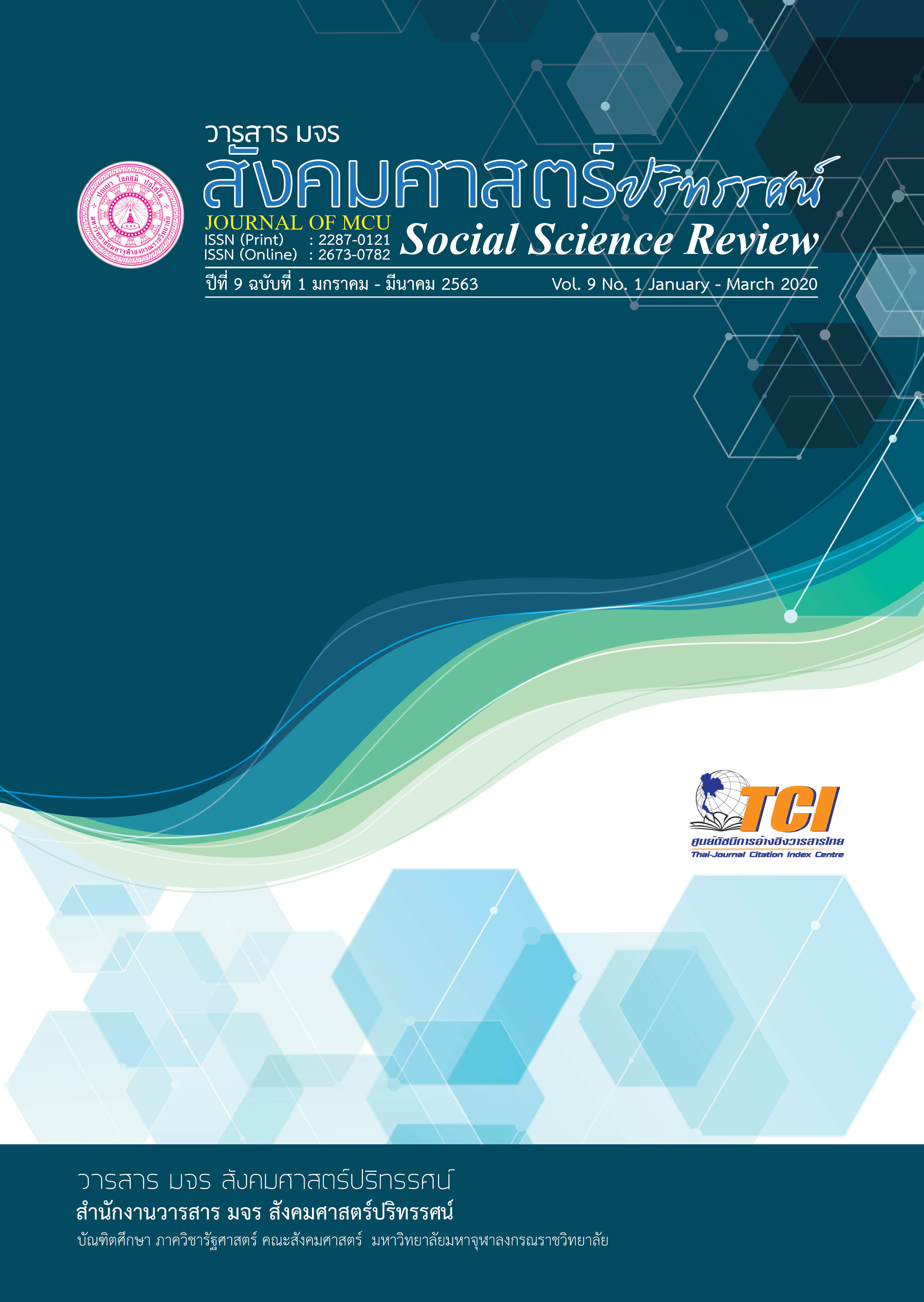การพัฒนาบทบาทของพระสงฆ์ในการเสริมสร้างสัมมาชีพ แก่ประชาชนในจังหวัดราชบุรี
คำสำคัญ:
การพัฒนา, บทบาทพระสงฆ์, การเสริมสร้างสัมมาชีพบทคัดย่อ
บทความนี้มีวัตถุประสงค์เพื่อศึกษาสภาพปัจจุบัน บทบาทพระสงฆ์ และการพัฒนาบทบาทของพระสงฆ์ในการเสริมสร้างสัมมาชีพแก่ประชาชนในจังหวัดราชบุรี เป็นการวิจัยเชิงคุณภาพ สัมภาษณ์เชิงลึกกับผู้ให้ข้อมูลสำคัญ 25 รูป/คน และสนทนากลุ่มเฉพาะกับผู้เชี่ยวชาญ 10 รูป/คน เครื่องมือที่ใช้คือแบบสัมภาษณ์ และแบบสนทนากลุ่มเฉพาะ วิเคราะห์ข้อมูลด้วยเทคนิคการวิเคราะห์เนื้อหาเชิงพรรณนา ผลการวิจัยพบว่า 1. สภาพปัจจุบันมีการดำเนินการครอบคลุมงาน 6 ด้าน คือ 1) ด้านการพัฒนาผู้นำสัมมาชีพ 2) ด้านการประชุมเชิงปฏิบัติการวิทยากรสัมมาชีพชุมชนระดับจังหวัด 3) ด้านการเตรียมความพร้อมทีมวิทยากรสัมมาชีพชุมชนระดับหมู่บ้าน 4) ด้านการเตรียมความพร้อมครัวเรือนเป้าหมาย 5) ด้านการสร้างสัมมาชีพชุมชนในระดับหมู่บ้าน และ 6) ด้านการจัดตั้งและพัฒนากลุ่มอาชีพ 2. พระสงฆ์สามารถร่วมเป็นวิทยากรสัมมาชีพชุมชนโดยรับผิดชอบเกี่ยวกับสาระความรู้ ปรัชญา หลักการ และแนวคิดสัมมาอาชีวะที่เป็นต้นแบบของการพัฒนามาสู่แนวคิดสัมมาชีพชุมชน 3. การพัฒนาบทบาทของพระสงฆ์ในการเสริมสร้างสัมมาชีพแก่ประชาชนในจังหวัดราชบุรี พบว่า 1) มีการจัดทำหลักสูตรสังฆวิทยากรสัมมาชีพ 2) มีการตั้งทีมสังฆวิทยากรสัมมาชีพ 3) มีการประชาสัมพันธ์และคัดเลือกหมู่บ้านที่มีความพร้อม 4) มีการลงพื้นที่ตรวจเยี่ยมหมู่บ้านเป้าหมาย 5) มีการฝึกอบรมสัมมาชีพชุมชนเชิงพุทธ และ 6) มีการติดตามประเมินผลอย่างเป็นรูปธรรมและการจัดตั้งกลุ่มพัฒนาสัมมาชีพเชิงพุทธ
เอกสารอ้างอิง
กรมพัฒนาชุมชน กระทรวงมหาดไทย. (2559). แนวทางการสร้างสัมมาชีพชุมชน. กรุงเทพฯ: กรมพัฒนาชุมชน กระทรวงมหาดไทย.
มหาจุฬาลงกรณราชวิทยาลัย. (2539). พระไตรปิฎกฉบับภาษาไทย ฉบับมหาจุฬาลงกรณราชวิทยาลัย. กรุงเทพฯ: โรงพิมพ์มหาจุฬาลงกรณราชวิทยาลัย.
บูรกรณ์ บริบูรณ์ และวิบูลย์ แมนสถิตย์. (2554). รูปแบบการนำตนเองเข้าไปผูกพันกับชุมชนของพระสงฆ์ในการแก้ไขปัญหาสังคม (รายงานผลการวิจัย). พระนครศรีอยุธยา: มหาวิทยาลัยมหาจุฬาลงกรณราชวิทยาลัย.
ประเวศ วะสี. (2552). สร้างสัมมาชีพเต็มพื้นที่. กรุงเทพฯ: บริษัท ที คิว พี จำกัด.
พรปวีณ์ หวานขมและคณะ. (2558). การบริหารจัดการการเรียนรู้ชุมชนเพื่อประกอบสัมมาชีพ องค์การบริหารส่วนตำบลหนองเหล็ก อำเภอโกสุมพิสัย จังหวัดมหาสารคาม. วารสารช่อพะยอม, 26(2), 209-222.
พระครูอุดมจารุวรรณ คำไล้ จารุวํโส. (2560). การพัฒนาบทบาทพระสงฆ์ในการส่งเสริมโครงการตลาดประชารัฐเพื่อประชาชนในกรุงเทพฯ (วิทยานิพนธ์ปริญญาพุทธศาสตรดุษฎีบัณฑิต สาขาวิชาการจัดการเชิงพุทธ). พระนครศรีอยุธยา: มหาวิทยาลัยมหาจุฬาลงกรณราชวิทยาลัย.
พระจิตศิลป์ เหมรํสี. (2560). การจัดการสินค้าชุมชนวิถีพุทธในจังหวัดกาญจนบุรี (วิทยานิพนธ์ปริญญาพุทธศาสตรดุษฎีบัณฑิต สาขาวิชาการจัดการเชิงพุทธ). พระนครศรีอยุธยา: มหาวิทยาลัยมหาจุฬาลงกรณราชวิทยาลัย.
พระพรหมคุณาภรณ์ (ป.อ. ปยุตฺโต). (2553). พจนานุกรมพุทธศาสตร์ ฉบับประมวลธรรม (พิมพ์ครั้งที่ 18). นนทบุรี: เพิ่มทรัพย์การพิมพ์.
________. (2555). พุทธธรรมฉบับปรับขยาย (พิมพ์ครั้งที่ 35). กรุงเทพฯ: สำนักพิมพ์ผลิธัมม์.
พระราเชนทร์ วิสารโธ และพระมหานรากร วรเมธี. (2556). การบูรณาการหลักพุทธธรรมในการแก้ปัญหาความยากจนของพระสงฆ์ในจังหวัดอุดรธานี: ศึกษาเฉพาะกรณีพระเทพรัตนมุนี (รายงานผลการวิจัย). พระนครศรีอยุธยา: มหาวิทยาลัยมหาจุฬาลงกรณราชวิทยาลัย.
พระมหาคำพันธุ์ รณญฺชโย. (2562). การพัฒนาบทบาทของพระสงฆ์ในการเสริมสร้างสัมมาชีพแก่ประชาชนในจังหวัดราชบุรี (วิทยานิพนธ์ปริญญาพุทธศาสตรดุษฎีบัณฑิต สาขาวิชาการจัดการเชิงพุทธ). พระนครศรีอยุธยา: มหาวิทยาลัยมหาจุฬาลงกรณราชวิทยาลัย.
วศิน อินทสระ. (2554). หลักธรรมอันเป็นหัวใจของพระพุทธศาสนา (พิมพ์ครั้งที่ 2). กรุงเทพฯ: ธรรมดา.
ศุภมาส เหล็นเรือง และคณะ. (2560). ปัจจัยที่มีผลต่อความสำเร็จในการขับเคลื่อนสัมมาชีพชุมชน ศึกษากรณีอำเภอนาดูน จังหวัดมหาสารคาม (รายงานผลการวิจัย). กรุงเทพฯ: สถาบันดำรงราชานุภาพ.
อภิชัย พันธเสน. (2544). พุทธเศรษฐศาสตร์: วิวัฒนาการ ทฤษฎี และการประยุกต์กับเศรษฐศาสตร์สาขาต่างๆ. กรุงเทพฯ: สำนักพิมพ์อมรินทร์.
ดาวน์โหลด
เผยแพร่แล้ว
รูปแบบการอ้างอิง
ฉบับ
ประเภทบทความ
สัญญาอนุญาต
ลิขสิทธิ์ (c) 2020 วารสาร มจร สังคมศาสตร์ปริทรรศน์

อนุญาตภายใต้เงื่อนไข Creative Commons Attribution-NonCommercial-NoDerivatives 4.0 International License.
เพื่อให้เป็นไปตามกฎหมายลิขสิทธิ์ ผู้นิพนธ์ทุกท่านต้องลงลายมือชื่อในแบบฟอร์มใบมอบลิขสิทธิ์บทความให้แก่วารสารฯ พร้อมกับบทความต้นฉบับที่ได้แก้ไขครั้งสุดท้าย นอกจากนี้ ผู้นิพนธ์ทุกท่านต้องยืนยันว่าบทความต้นฉบับที่ส่งมาตีพิมพ์นั้น ได้ส่งมาตีพิมพ์เฉพาะในวารสาร มจร สังคมศาสตร์ปริทรรศน์ เพียงแห่งเดียวเท่านั้น หากมีการใช้ภาพหรือตารางหรือเนื้อหาอื่นๆ ของผู้นิพนธ์อื่นที่ปรากฏในสิ่งตีพิมพ์อื่นมาแล้ว ผู้นิพนธ์ต้องขออนุญาตเจ้าของลิขสิทธิ์ก่อน พร้อมทั้งแสดงหนังสือที่ได้รับการยินยอมต่อบรรณาธิการ ก่อนที่บทความจะได้รับการตีพิมพ์ หากไม่เป็นไปตามข้อกำหนดเบื้องต้น ทางวารสารจะถอดบทความของท่านออกโดยไม่มีข้อยกเว้นใดๆ ทั้งสิ้น





